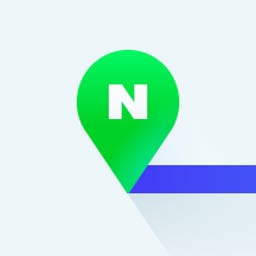- 네이버 지도
- 공간을 검색합니다. 생활을 연결합니다. 장소, 버스, 지하철, 도로 등 모든 공간의 정보를 하나의 검색으로 연결한 새로운 지도를 만나보세요.
Hello! Today, we'll learn a useful phrase for when you get lost while traveling in Korea: "Is this place...?" This phrase is used when you want to check your current location in an unfamiliar place. In this article, we'll learn the meaning of this phrase, its pronunciation, various applications, and tips for finding your way around Korea.

1. Meaning and Pronunciation of "이곳이 어디예요?"
1) Expression
이곳이 어디예요?
(i-go-si eo-di-ye-yo?)
→ Meaning: Where am I? / What is this place?
2) Pronunciation
이곳이 (i-go-si): "i" is pronounced like the "ee" in "see", "go" like the "go" in "go", and "si" similarly to "she".
어디예요 (eo-di-ye-yo): "eo" is similar to the "uh" in "under", and "di" is pronounced short and clearly. "ye-yo" is smoothly connected.
3) Importance of Honorifics
In Korea, it is polite to use honorifics when speaking to someone you meet for the first time or a stranger. **"이곳이 어디예요?"** is an appropriate expression to politely ask for directions.
2. Situations Where You Can Use "이곳이 어디예요?"
1) When Lost
When you want to ask for your current location in a tourist area.
"죄송합니다, 이곳이 어디예요?"
(Excuse me, where am I?)
2) When You Want to Confirm a Specific Location
When the map and actual location don't match:
"이곳이 서울역 근처인가요?"
(Is this near Seoul Station?)
3) When Asking for Help
When asking a local or a shop staff:
"이곳이 명동인가요?"
(Is this Myeongdong?)
3. Various Applied Expressions
1) Asking for Location
"여기가 무슨 건물이에요?"
(What is this building?)
"근처에 어떤 관광지가 있어요?"
(What tourist attractions are nearby?)
2) Asking about Specific Locations
"이곳이 서울역 근처 맞나요?"
(Is this near Seoul Station?)
"명동까지 얼마나 걸리나요?"
(How far is it to Myeongdong?)
3) Map-Related Expressions
"이 지도에서 여기가 어디예요?"
(Where is this place on the map?)
"지도를 봐도 잘 모르겠어요."
(I can’t figure out the map.)
4. Frequently Heard Responses
1) Explaining the Current Location
"여기는 서울역입니다."
(This is Seoul Station.)
"이곳은 명동이에요."
(This is Myeongdong.)
2) Giving Directions
"지금 여기에서 오른쪽으로 가시면 됩니다."
(From here, go to the right.)
"이 길 따라 쭉 가세요."
(Just follow this road.)
3) Explaining the Distance
"걸어서 10분 거리예요."
(It’s a 10-minute walk.)
"택시로 5분 걸립니다."
(It takes 5 minutes by taxi.)
5. Useful Tips for Finding Your Way
1) Using Map Apps
**Naver Map (네이버 지도)** and **Kakao Map (카카오맵)** both support English and Korean.
Naver Map download - https://map.naver.com/p/
Kakao Map download -<span class="ck-fake-link-selection ck-fake-link-selection_collapsed"></span>
2) Utilizing Major Landmarks
Mentioning nearby famous landmarks will help when explaining your location.
Example: "N Seoul Tower 근처인가요?" (Is this near N Seoul Tower?)
3) Learning Basic Korean Phrases
In addition to "이곳이 어디예요?", learning simple directional questions is useful.
"이쪽으로 가면 뭐가 나오나요?"
(What will I find if I go this way?)
"길 건너편에도 가게가 있나요?"
(Are there shops across the street?)
6. Practical Conversation Examples
Example 1: At a Tourist Spot
Tourist: "이곳이 어디예요?"
(Where am I?)
Local: "여기는 경복궁입니다."
(This is Gyeongbokgung Palace.)
Example 2: Asking for Directions
Tourist: "이 근처에 편의점이 있나요?"
(Is there a convenience store nearby?)
Local: "네, 저기 코너를 돌면 보일 거예요."
(Yes, you’ll see it around the corner.)
Example 3: Question Using a Map
Tourist: "이 지도에서 여기가 어디인가요?"
(Where is this place on the map?)
Local: "지금 여기 계신 곳은 명동입니다."
(You’re currently in Myeongdong.)
7. Frequently Asked Questions (FAQ)
Q: What is the difference between "여기" and "이곳"?
A: Both expressions mean "this place," but **"여기"** is more casual and familiar. **"이곳"** is a bit more formal.
Q: Is it okay to ask in English?
A: English may be understood in major tourist areas, but using simple Korean phrases will likely result in a more friendly response from locals.
Q: What should I do first when I get lost?
A: Check your map, or ask for help from staff at a nearby store or public place.
8. Today’s Summary
"이곳이 어디예요?" is an essential phrase for traveling in Korea, and is very useful when you are lost or want to know your current location. Remembering the phrase and its various applications, confidently try finding your way around Korea!
Have you ever gotten lost while traveling in Korea? Or are there any other Korean phrases you’d like to learn? Let us know in the comments!

Comments0